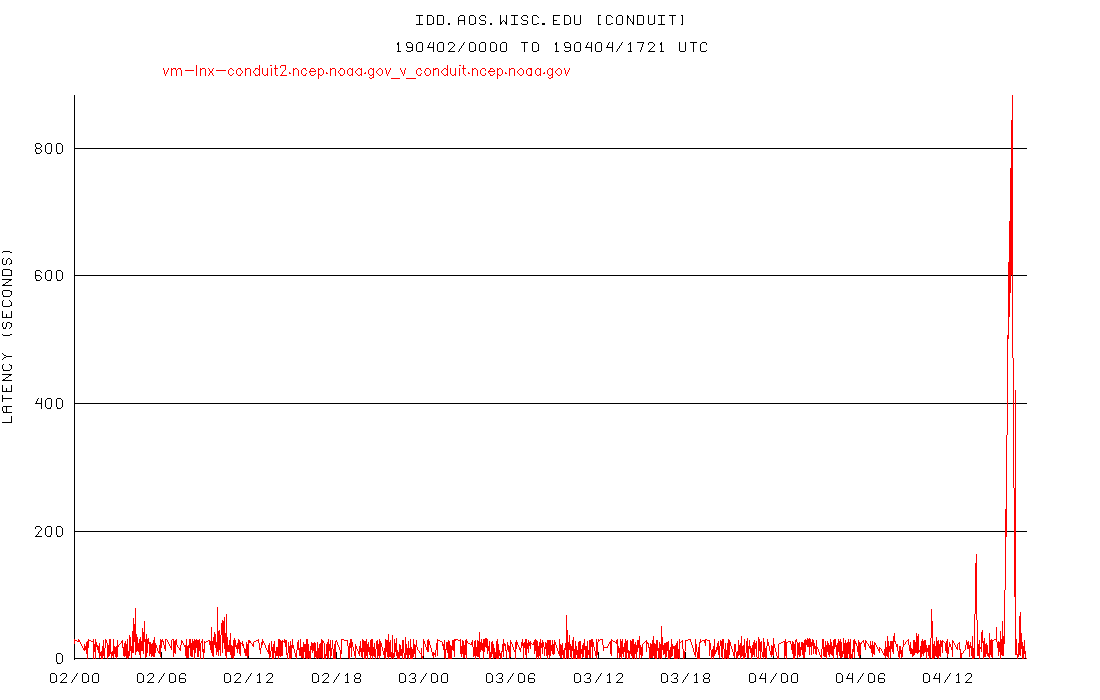Derek,
I wasn't sure how you orchestrated the path... so does that mean you redirected the traffic from the D.C. area to Boulder for distribution? Interesting that other applications were directed that way also, because I was
noticing huge latencies in the MRMS feed that also disappeared on Tuesday as well. Would that have been affected by the switch?
Art
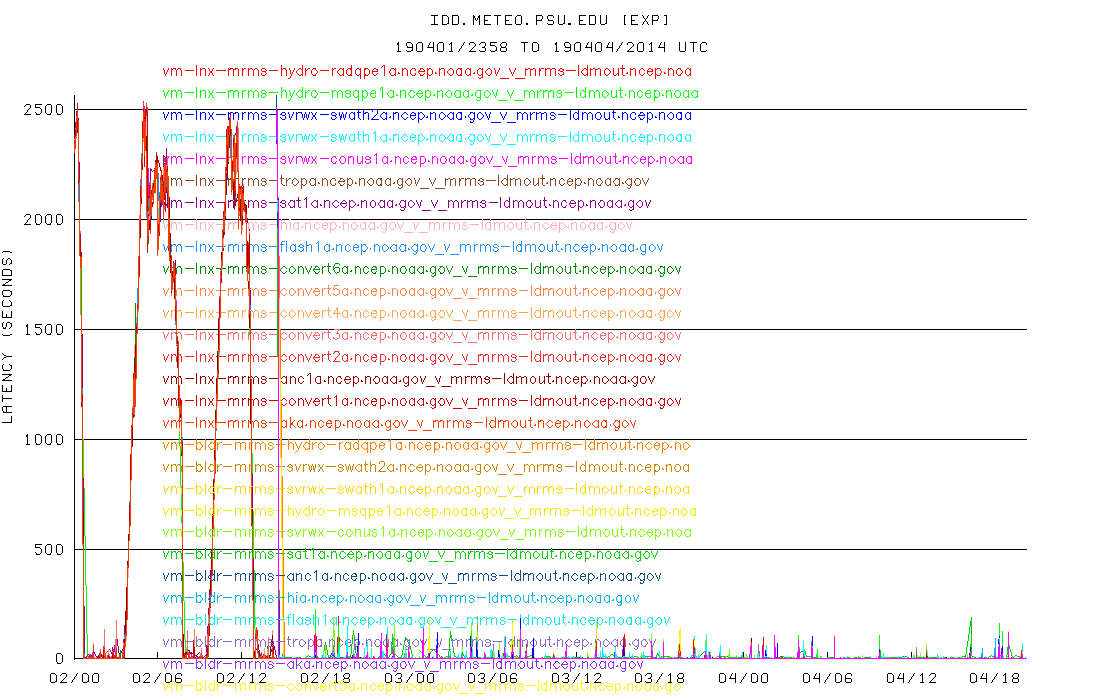
Arthur A. Person
Assistant Research Professor, System Administrator
Penn State Department of Meteorology and Atmospheric Science
email: address@hidden,
phone: 814-863-1563
From: Derek VanPelt - NOAA Affiliate <address@hidden>
Sent: Friday, April 5, 2019 3:15 PM
To: Person, Arthur A.
Cc: Carissa Klemmer - NOAA Federal; Pete Pokrandt; Gilbert Sebenste; address@hidden; _NCEP.List.pmb-dataflow; address@hidden
Subject: Re: Large lags on CONDUIT feed - started a week or so ago
Art/All,
I wanted to quickly clarify one thing. Our conduit server did not move to Boulder.
On Tuesday almost every other application the NCO runs went from College Park to Boulder. This may change some of the interpretation of the graphs and data.
As a heads up, we will be moving the applications back to College Park on Monday and/or Tuesday. We will want to review are numbers then, and I would suggest that splitting the requests may still be best practice.
Stay tuned,
Derek
On Fri, Apr 5, 2019 at 3:10 PM Person, Arthur A. < address@hidden> wrote:
Carissa,
The Boulder connection is definitely performing very well for CONDUIT. Although there have been a couple of little blips (~ 120 seconds) since yesterday, overall the performance is superb. I don't think it's quite
as clean as prior to the ~February 10th date when the D.C. connection went bad, but it's still excellent performance. Here's our graph now with a single connection (no splits):
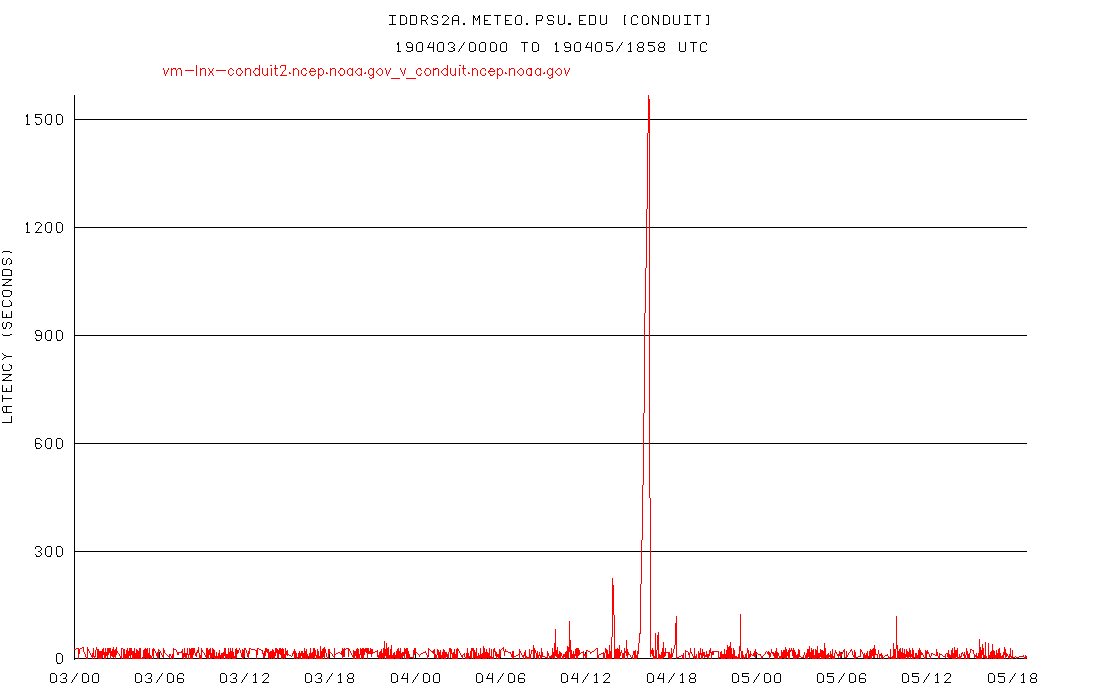
My next question is: Will CONDUIT stay pointing at Boulder until D.C. is fixed, or might you be required to switch back to D.C. at some point before that?
Thanks... Art
Arthur A. Person
Assistant Research Professor, System Administrator
Penn State Department of Meteorology and Atmospheric Science
email: address@hidden,
phone: 814-863-1563
From: Carissa Klemmer - NOAA Federal <address@hidden>
Sent: Thursday, April 4, 2019 6:22 PM
To: Person, Arthur A.
Cc: Pete Pokrandt; Derek VanPelt - NOAA Affiliate; Gilbert Sebenste;
address@hidden; _NCEP.List.pmb-dataflow;
address@hidden
Subject: Re: Large lags on CONDUIT feed - started a week or so ago
Catching up here.
Derek,
Do we have traceroutes from all users? Does anything in VCenter show any system resource constraints?
On Thursday, April 4, 2019, Person, Arthur A. < address@hidden> wrote:
Yeh, definitely looks "blipier" starting around 7Z this morning, but nothing like it was before. And all last night was clean. Here's our graph with a 2-way split, a huge improvement over what it was before the
switch to Boulder:
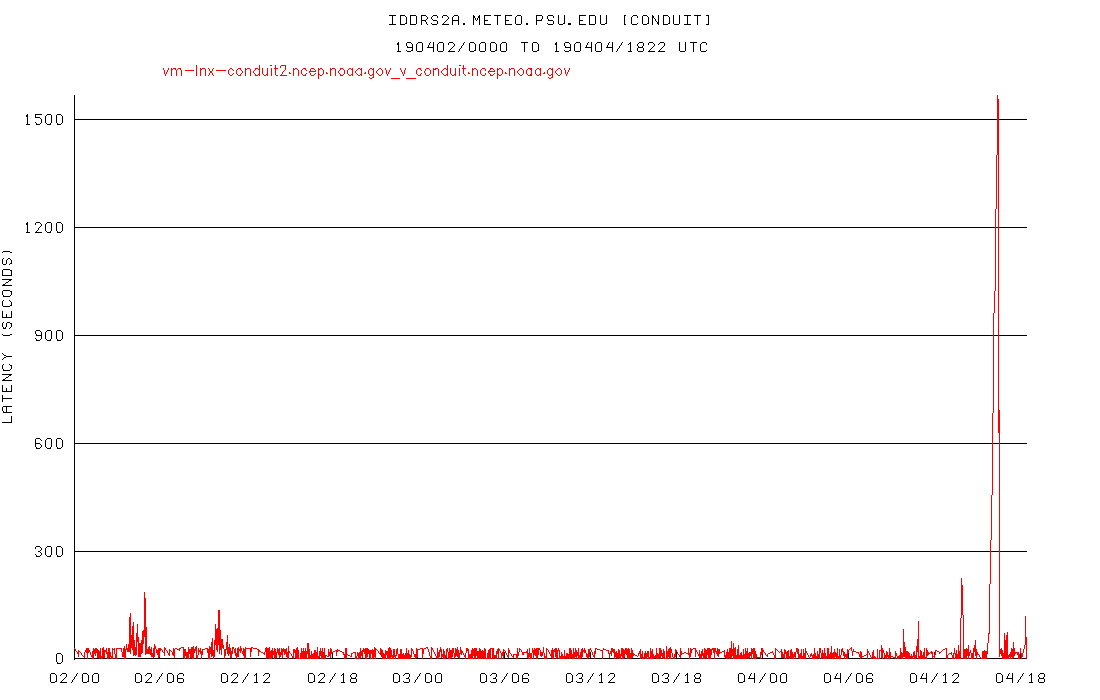
Agree with Pete that this morning's data probably isn't a good test since there were other factors. Since this seems so much better, I'm going to try switching to no split as an experiment and see how it holds up.
Art
Arthur A. Person
Assistant Research Professor, System Administrator
Penn State Department of Meteorology and Atmospheric Science
email: address@hidden,
phone: 814-863-1563
From: Pete Pokrandt <address@hidden>
Sent: Thursday, April 4, 2019 1:51 PM
To: Derek VanPelt - NOAA Affiliate
Cc: Person, Arthur A.; Gilbert Sebenste; Anne Myckow - NOAA Affiliate;
address@hidden; _NCEP.List.pmb-dataflow;
address@hidden
Subject: Re: [Ncep.list.pmb-dataflow] [conduit] Large lags on CONDUIT feed - started a week or so ago
Ah, so perhaps not a good test.. I'll set it back to a 5-way split and see how it looks tomorrow.
Thanks for the info,
Pete
--
Pete Pokrandt - Systems Programmer
UW-Madison Dept of Atmospheric and Oceanic Sciences
608-262-3086 - address@hidden
From: Derek VanPelt - NOAA Affiliate <address@hidden>
Sent: Thursday, April 4, 2019 12:38 PM
To: Pete Pokrandt
Cc: Person, Arthur A.; Gilbert Sebenste; Anne Myckow - NOAA Affiliate;
address@hidden; _NCEP.List.pmb-dataflow;
address@hidden
Subject: Re: [Ncep.list.pmb-dataflow] [conduit] Large lags on CONDUIT feed - started a week or so ago
HI Pete -- we did have a separate issu hit the CONDUIT feed today. We should be recovering now, but the backlog was sizeable. If these numbers are not back to the baseline in the next hour or so please let us know. We are also watching our queues and
they are decreasing, but not as quickly as we had hoped.
Thank you,
Derek
On Thu, Apr 4, 2019 at 1:26 PM 'Pete Pokrandt' via _NCEP list.pmb-dataflow < address@hidden> wrote:
FYI - there is still a much larger lag for the 12 UTC run with a 5-way split compared to a 10-way split. It's better since everything else failed over to Boulder, but I'd venture to guess that's not the root of the problem.
Prior to whatever is going on to cause this, I don'r recall ever seeing lags this large with a 5-way split. It looked much more like the left hand side of this graph, with small increases in lag with each 6 hourly model run cycle, but more like 100 seconds
vs the ~900 that I got this morning.
FYI I am going to change back to a 10 way split for now.
Pete
--
Pete Pokrandt - Systems Programmer
UW-Madison Dept of Atmospheric and Oceanic Sciences
608-262-3086 - address@hidden
From:
address@hidden <address@hidden> on behalf of Pete Pokrandt <address@hidden>
Sent: Wednesday, April 3, 2019 4:57 PM
To: Person, Arthur A.; Gilbert Sebenste; Anne Myckow - NOAA Affiliate
Cc: address@hidden; _NCEP.List.pmb-dataflow;
address@hidden
Subject: Re: [conduit] [Ncep.list.pmb-dataflow] Large lags on CONDUIT feed - started a week or so ago
Sorry, was out this morning and just had a chance to look into this. I concur with Art and Gilbert that things appear to have gotten better starting with the failover of everything else to Boulder yesterday. I will also reconfigure to go back to a 5-way split
(as opposed to the 10-way split that I've been using since this issue began) and keep an eye on tomorrow's 12 UTC model run cycle - if the lags go up, it usually happens worst during that cycle, shortly before 18 UTC each day.
I'll report back tomorrow how it looks, or you can see at
Thanks,
Pete
--
Pete Pokrandt - Systems Programmer
UW-Madison Dept of Atmospheric and Oceanic Sciences
608-262-3086 - address@hidden
Anne,
I'll hop back in the loop here... for some reason these replies started going into my junk file (bleh). Anyway, I agree with Gilbert's assessment. Things turned real clean around 12Z
yesterday, looking at the graphs. I usually look at
flood.atmos.uiuc.edu when there are problem as their connection always seems to be the cleanest. If there are even small blips or ups and downs in their latencies, that usually means there's a network aberration somewhere that usually amplifies into hundreds
or thousands of seconds at our site and elsewhere. Looking at their graph now, you can see the blipiness up until 12Z yesterday, and then it's flat (except for the one spike around 16Z today which I would ignore):
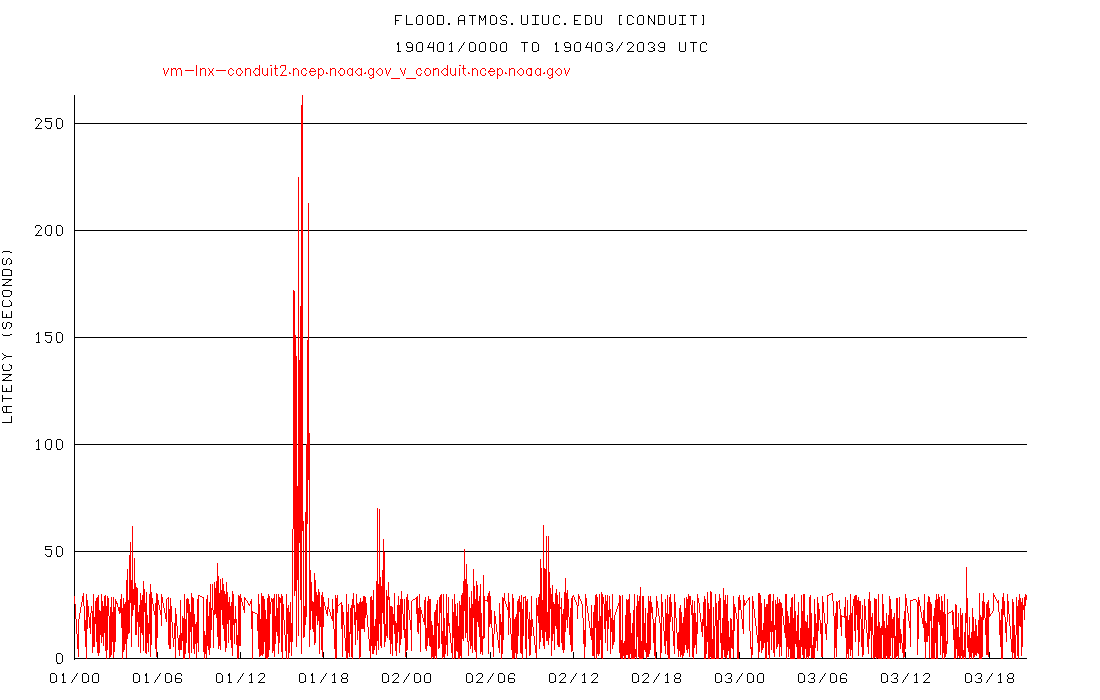
Our direct-connected site, which is using a 10-way split right now, also shows a return to calmness in the latencies:
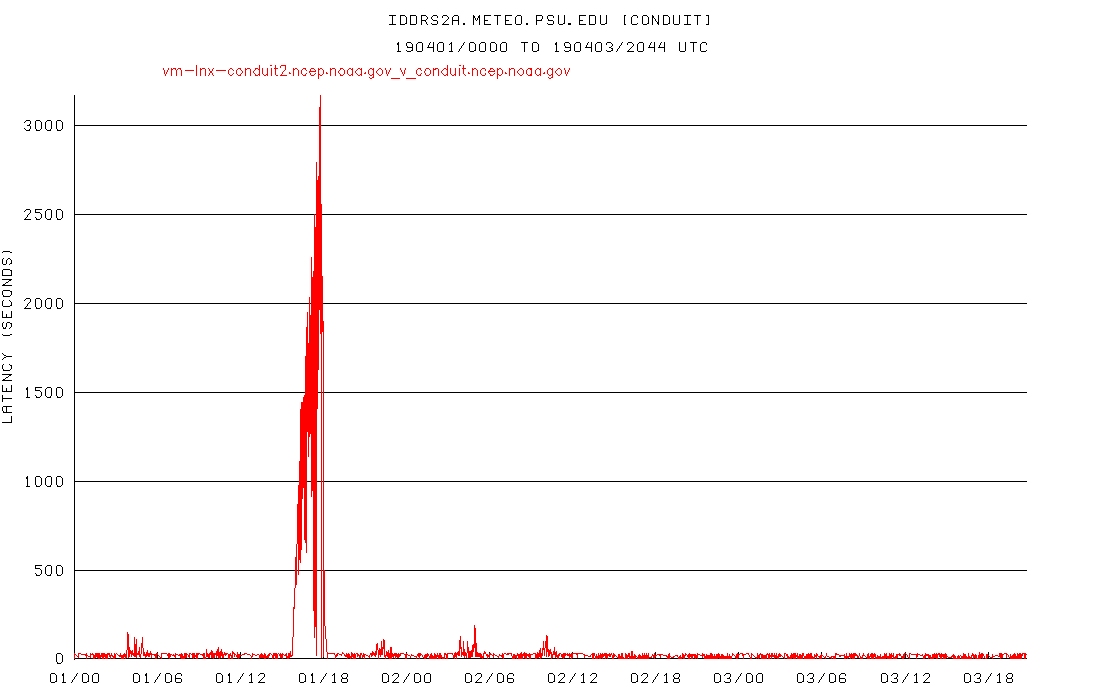
Prior to the recent latency jump, I did not use split requests and the reception had been stellar for quite some time. It's my suspicion that this is a networking congestion issue somewhere close to the source since
it seems to affect all downstream sites. For that reason, I don't think solving this problem should necessarily involve upgrading your server software, but rather identifying what's jamming up the network near D.C., and testing this by switching to Boulder
was an excellent idea. I will now try switching our system to a two-way split to see if this performance holds up with fewer pipes. Thanks for your help and I'll let you know what I find out.
Art
Arthur A. Person
Assistant Research Professor, System Administrator
Penn State Department of Meteorology and Atmospheric Science
email: address@hidden,
phone: 814-863-1563
On Wed, Apr 3, 2019 at 10:03 AM Anne Myckow - NOAA Affiliate < address@hidden> wrote:
Hi Pete,
As of yesterday we failed almost all of our applications to our site in Boulder (meaning away from CONDUIT). Have you noticed an improvement in your speeds since yesterday afternoon? If so this will give us a clue that maybe there's something interfering
on our side that isn't specifically CONDUIT, but another app that might be causing congestion. (And if it's the same then that's a clue in the other direction.)
Thanks,
Anne
The lag here at UW-Madison was up to 1200 seconds today, and that's with a 10-way split feed. Whatever is causing the issue has definitely not been resolved, and historically is worse during the work week than on the weekends. If that helps at all.
Pete
--
Pete Pokrandt - Systems Programmer
UW-Madison Dept of Atmospheric and Oceanic Sciences
608-262-3086 - address@hidden
From: Anne Myckow - NOAA Affiliate <address@hidden>
Sent: Thursday, March 28, 2019 4:28 PM
To: Person, Arthur A.
Cc: Carissa Klemmer - NOAA Federal; Pete Pokrandt; _NCEP.List.pmb-dataflow;
address@hidden;
address@hidden
Subject: Re: [Ncep.list.pmb-dataflow] Large lags on CONDUIT feed - started a week or so ago
We will not be upgrading to version 6.13 on these systems as they are not robust enough to support the local logging inherent in the new version.
I will check in with my team on if there are any further actions we can take to try and troubleshoot this issue, but I fear we may be at the limit of our ability to make this better.
I’ll let you know tomorrow where we stand. Thanks.
Anne
On Mon, Mar 25, 2019 at 3:00 PM Person, Arthur A. < address@hidden> wrote:
Carissa,
Can you report any status on this inquiry?
Thanks... Art
Arthur A. Person
Assistant Research Professor, System Administrator
Penn State Department of Meteorology and Atmospheric Science
email: address@hidden,
phone: 814-863-1563
From: Carissa Klemmer - NOAA Federal <address@hidden>
Sent: Tuesday, March 12, 2019 8:30 AM
To: Pete Pokrandt
Cc: Person, Arthur A.;
address@hidden;
address@hidden; _NCEP.List.pmb-dataflow
Subject: Re: Large lags on CONDUIT feed - started a week or so ago
Hi Everyone
I’ve added the Dataflow team email to the thread. I haven’t heard that any changes were made or that any issues were found. But the team can look today and see if we have any signifiers of overall slowness with anything.
Dataflow, try taking a look at the new Citrix or VM troubleshooting tools if there are any abnormal signatures that may explain this.
On Monday, March 11, 2019, Pete Pokrandt < address@hidden> wrote:
Art,
I don't know if NCEP ever figured anything out, but I've been able to keep my latencies reasonable (300-600s max, mostly during the 12 UTC model suite) by splitting my CONDUIT request 10 ways, instead of the 5 that I had been doing, or in a single request.
Maybe give that a try and see if it helps at all.
Pete
--
Pete Pokrandt - Systems Programmer
UW-Madison Dept of Atmospheric and Oceanic Sciences
608-262-3086 - address@hidden
From: Person, Arthur A. <address@hidden>
Sent: Monday, March 11, 2019 3:45 PM
To: Holly Uhlenhake - NOAA Federal; Pete Pokrandt
Cc: address@hidden;
address@hidden
Subject: Re: [conduit] Large lags on CONDUIT feed - started a week or so ago
Holly,
Was there any resolution to this on the NCEP end? I'm still seeing terrible delays (1000-4000 seconds) receiving data from
conduit.ncep.noaa.gov. It would be helpful to know if things are resolved at NCEP's end so I know whether to look further down the line.
Thanks... Art
Arthur A. Person
Assistant Research Professor, System Administrator
Penn State Department of Meteorology and Atmospheric Science
email: address@hidden,
phone: 814-863-1563
Hi Pete,
We'll take a look and see if we can figure out what might be going on. We haven't done anything to try and address this yet, but based on your analysis I'm suspicious that it might be tied to a resource constraint on the VM or the blade it resides on.
Thanks,
Holly Uhlenhake
Acting Dataflow Team Lead
On Thu, Feb 21, 2019 at 11:32 AM Pete Pokrandt < address@hidden> wrote:
Just FYI, data is flowing, but the large lags continue.
Pete
--
Pete Pokrandt - Systems Programmer
UW-Madison Dept of Atmospheric and Oceanic Sciences
608-262-3086 - address@hidden
Data is flowing again - picked up somewhere in the GEFS. Maybe CONDUIT server was restarted, or ldm on it? Lags are large (3000s+) but dropping slowly
Pete
--
Pete Pokrandt - Systems Programmer
UW-Madison Dept of Atmospheric and Oceanic Sciences
608-262-3086 - address@hidden
Just a quick follow-up - we started falling far enough behind (3600+ sec) that we are losing data. We got short files starting at 174h into the GFS run, and only got (incomplete) data through 207h.
We have now not received any data on CONDUIT since 11:27 AM CST (1727 UTC) today (Wed Feb 20)
Pete
--
Pete Pokrandt - Systems Programmer
UW-Madison Dept of Atmospheric and Oceanic Sciences
608-262-3086 - address@hidden
Carissa,
We have been feeding CONDUIT using a 5 way split feed direct from
conduit.ncep.noaa.gov, and it had been really good for some time, lags 30-60 seconds or less.
However, the past week or so, we've been seeing some very large lags during each 6 hour model suite - Unidata is also seeing these - they are also feeding direct from
conduit.ncep.noaa.gov.
Any idea what's going on, or how we can find out?
Thanks!
Pete
--
Pete Pokrandt - Systems Programmer
UW-Madison Dept of Atmospheric and Oceanic Sciences
608-262-3086 - address@hidden
_______________________________________________
NOTE: All exchanges posted to Unidata maintained email lists are
recorded in the Unidata inquiry tracking system and made publicly
available through the web. Users who post to any of the lists we
maintain are reminded to remove any personal information that they
do not want to be made public.
conduit mailing list
address@hidden
For list information or to unsubscribe, visit:
http://www.unidata.ucar.edu/mailing_lists/
--
Carissa Klemmer
NCEP Central Operations
IDSB Branch Chief
301-683-3835
_______________________________________________
Ncep.list.pmb-dataflow mailing list
address@hidden
https://www.lstsrv.ncep.noaa.gov/mailman/listinfo/ncep.list.pmb-dataflow
--
Anne Myckow
Lead Dataflow Analyst
NOAA/NCEP/NCO
301-683-3825
--
Anne Myckow
Lead Dataflow Analyst
NOAA/NCEP/NCO
301-683-3825
_______________________________________________
NOTE: All exchanges posted to Unidata maintained email lists are
recorded in the Unidata inquiry tracking system and made publicly
available through the web. Users who post to any of the lists we
maintain are reminded to remove any personal information that they
do not want to be made public.
conduit mailing list
address@hidden
For list information or to unsubscribe, visit:
http://www.unidata.ucar.edu/mailing_lists/
--
----
Gilbert Sebenste
Consulting Meteorologist
AllisonHouse, LLC
_______________________________________________
Ncep.list.pmb-dataflow mailing list
address@hidden
https://www.lstsrv.ncep.noaa.gov/mailman/listinfo/ncep.list.pmb-dataflow
--
Derek Van Pelt
DataFlow Analyst
NOAA/NCEP/NCO
--
Carissa Klemmer
NCEP Central Operations
IDSB Branch Chief
301-683-3835
--
Derek Van Pelt
DataFlow Analyst
NOAA/NCEP/NCO
|




